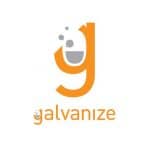
Galvanize
Galvanize Review and Guide
Galvanize is an online and in-person coding bootcamp for people who want a career in software engineering or data science. This Galvanize review will cover the programs, tuition cost, and application process to help you decide if the bootcamp is for you.
About Galvanize
Galvanize has more than nine campuses and produces highly-trained software engineers and data scientists. It offers both part-time and full-time programs.
The bootcamp is a great starting point for students who have some experience with programming and math. However, complete newbies who want to transition to tech can also enroll. You can take a prep course to ease you into the fast-paced curriculum.
Galvanize Programs
This coding bootcamp has online prep courses alongside two major programs. The foundational courses will help you to learn the basics of a tech discipline before moving on to the full-time courses.
Software Engineering Immersive Bootcamp
This program focuses on app design and development and full stack JavaScript. You will also learn data structures and how to think like an engineer. Your instructors will show you how to use JavaScript Instantiation Patterns and inheritance patterns.
The program’s curriculum includes server-side technologies, browser animation, databases, and Node. In addition, you will master API frameworks, JS frameworks, and CSS frameworks.
Location: Online
Tuition: $17,980
Online Data Science Bootcamp
This intensive data science course follows a Python-based curriculum. You will learn statistical analysis and fundamental data science concepts. The course also includes guidance in using different libraries like Pandas, NumPy, and SciPy.
The curriculum also covers machine learning and handling real-world issues by regressing, classifying, and clustering datasets. Students develop a conceptual understanding of these models before using libraries.
Location: Online
Tuition: $17,980
Python Fundamentals
This program focuses on Python fundamentals. It also includes basic programming skills that could come in handy in day-to-day use in the tech field. Students work on pythonic coding, data science workflow, environmental setup, and object-oriented programming. It also covers coding in Python and teaches about popular data science libraries like Pandas, Matplotlib, Sklearn, and NumPy.
Location: Online
Tuition: $17,000
Data Science Basic Prep
This prep course has a self-paced schedule. It guides students in developing the necessary skills in statistics and foundational Python to prepare them for the immersive programs. Via a dedicated Slack channel, you and your fellow cohorts can study together and support each other.
Location: Online
Tuition: Free
Galvanize Application Process
The application process involves filling in the online application form, finishing the prep, and the admissions assessment. Start by applying on the school’s website and taking the free prep course online. After this foundation course, you will complete an admissions assessment based on the course you took.
More experienced people can choose a coding challenge instead of taking a prep course first. If you pass, the admissions team will inform you, and you can make payment. Once this is done, you’re all set for class.
Galvanize Tuition and Financing Options
Galvanize has different tuition costs, based on the chosen program and schedule. However, it does offer a free prep course. There are several financing options as well.
Students can use an income share agreement to defer tuition payment until they secure a job. Also, you can pay upfront by making a deposit of $2,000 to secure your spot in the program.
You also have the option of using one of the coding bootcamp’s lending partners. Galvanize works with Skills Fund and Climb Credit to offer loans to finance tuition. Students can use installments to cover payment or scholarship awards. The coding bootcamp also accepts the GI Bill for veterans.
Price Range
$0-$48,0005 Reviews
Sorry, the comment form is closed at this time.

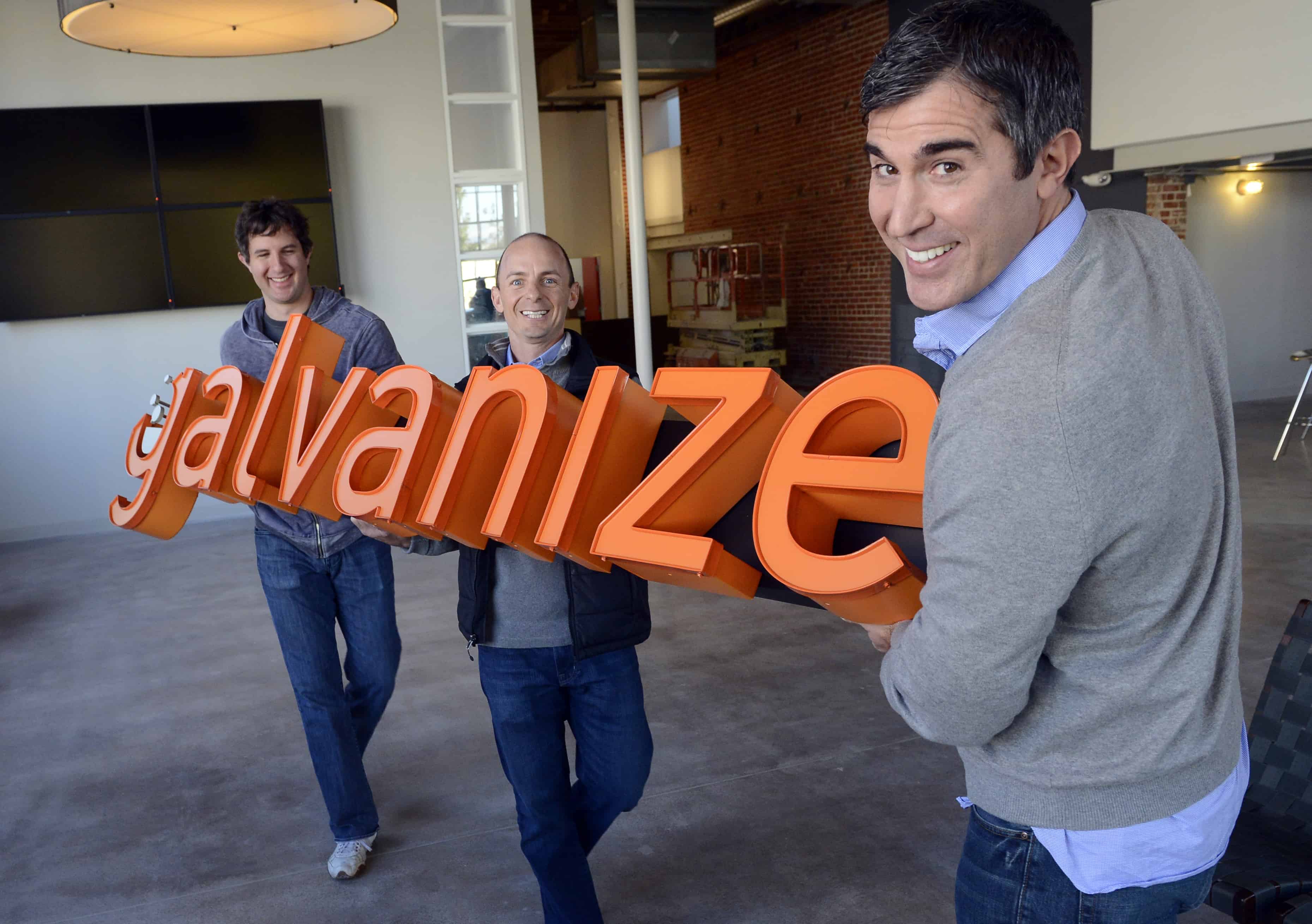

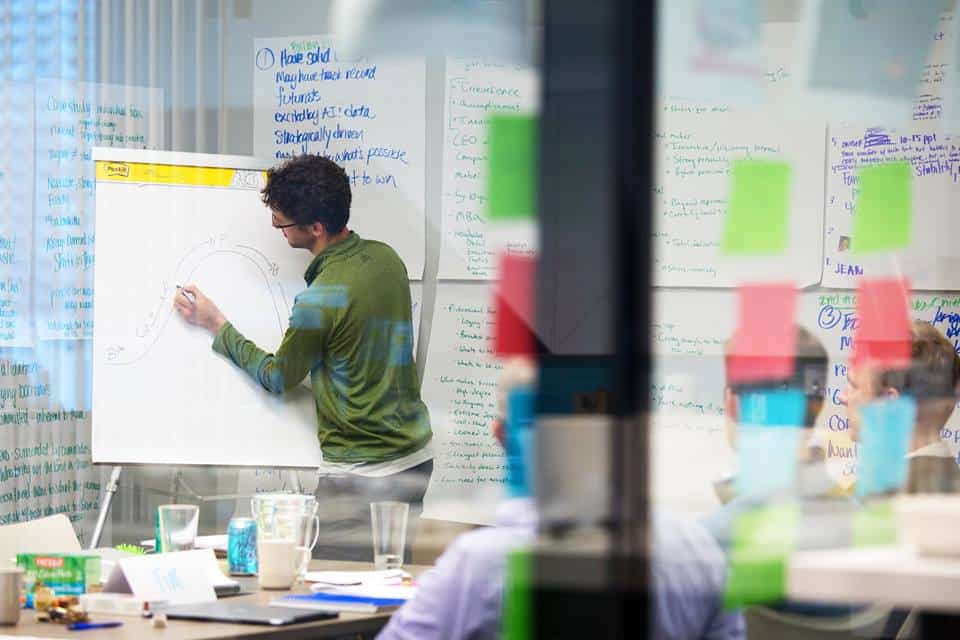

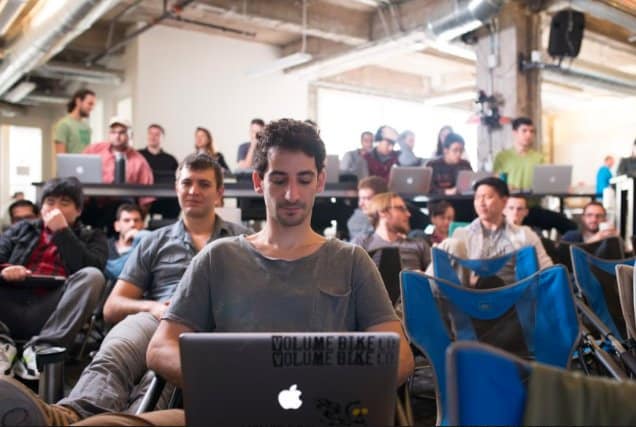
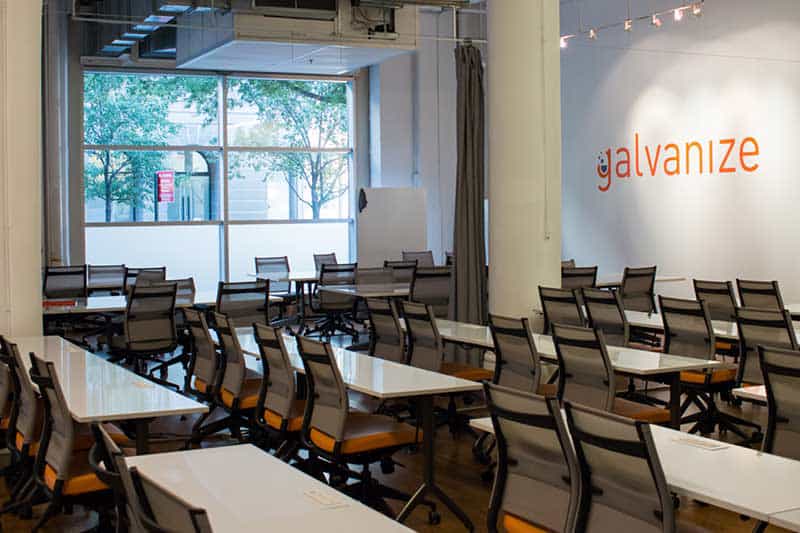
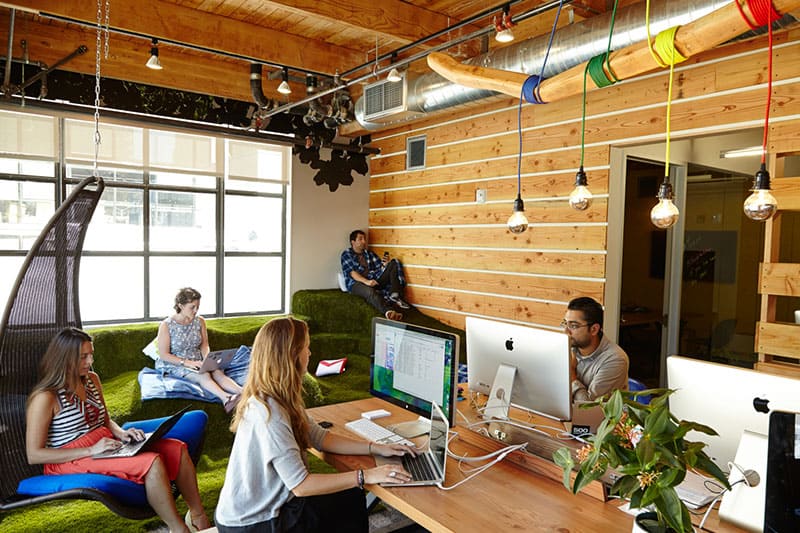

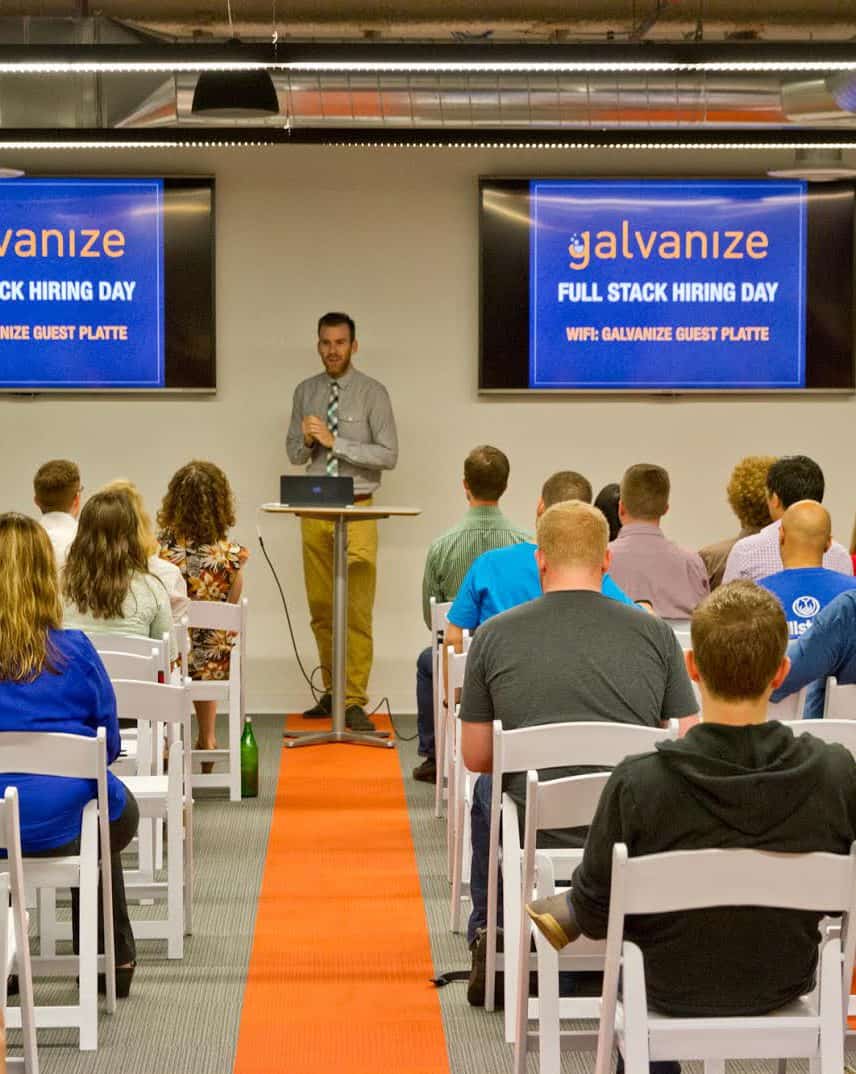
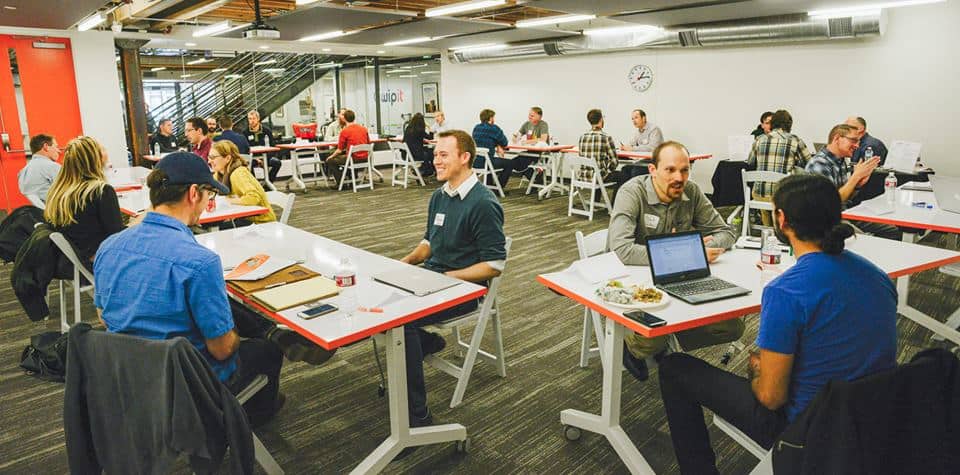
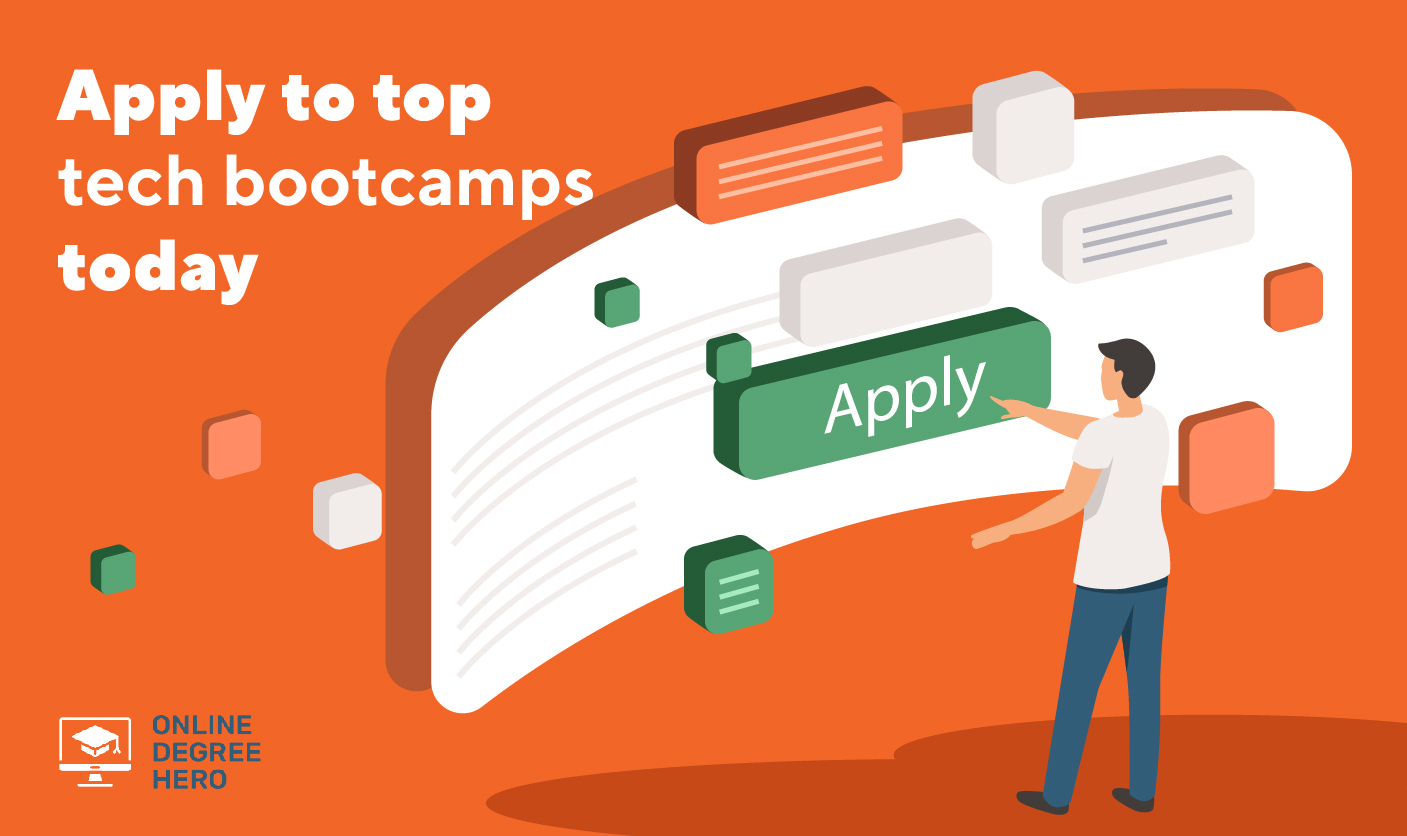
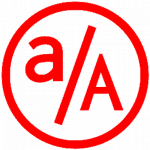
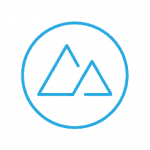
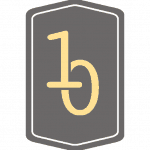
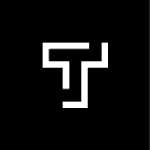
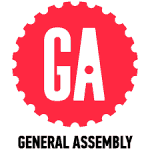
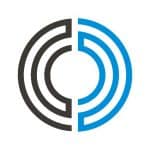



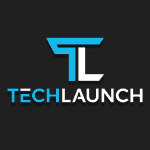
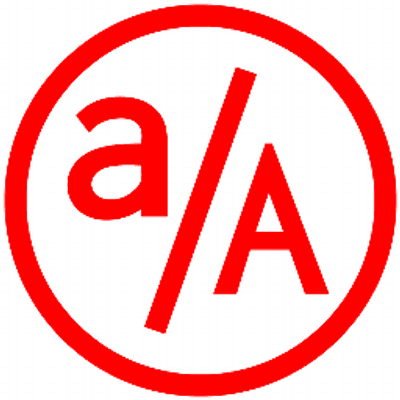
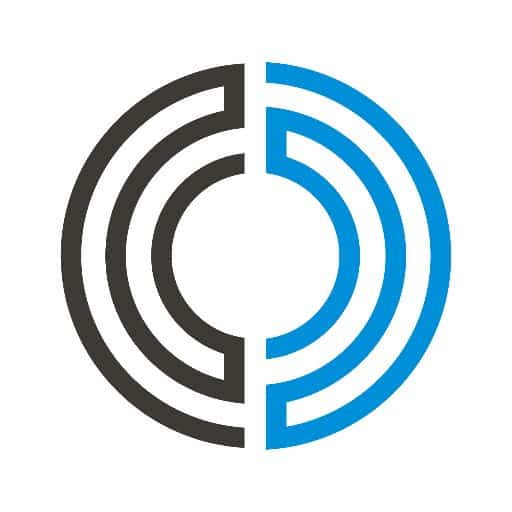
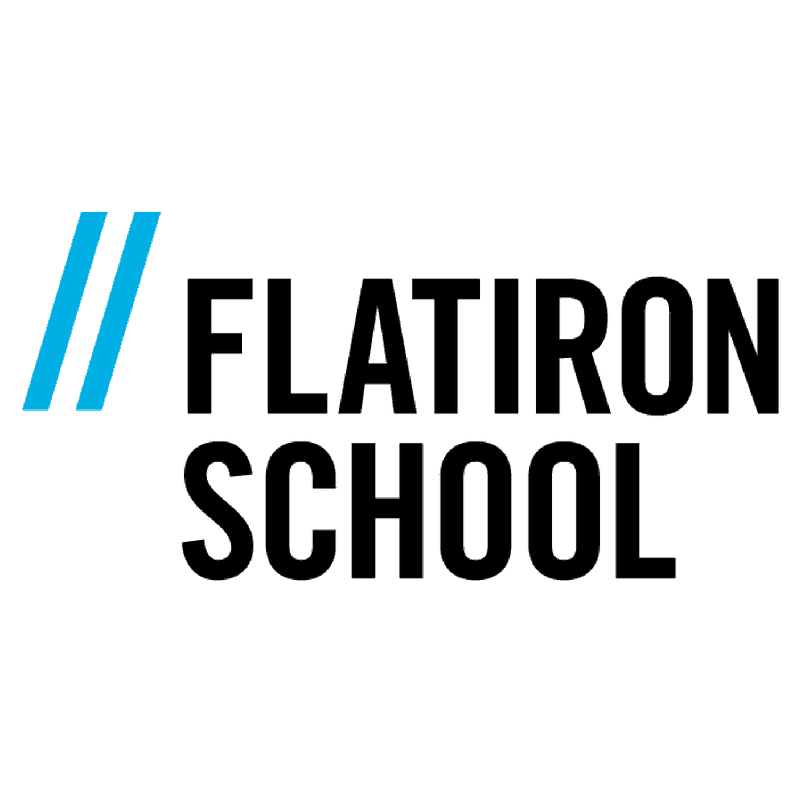
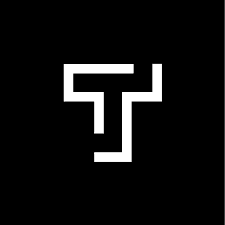
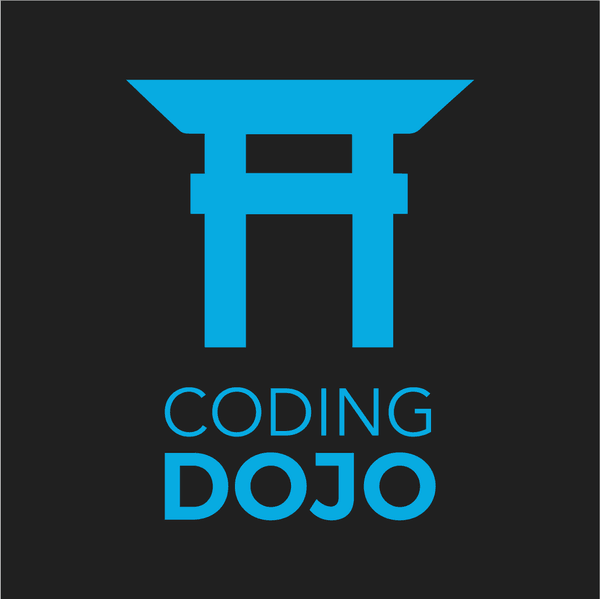
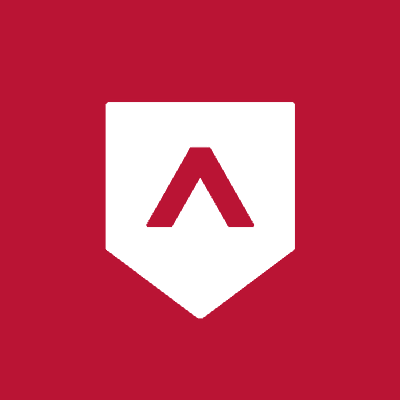
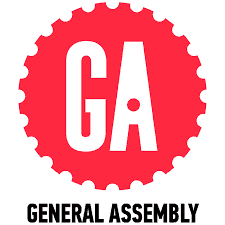


Anonymous
Intro
I used to work as a principal software engineer at a big software company for many years doing full stack Java web development. I wanted a new job but everything in web development has changed from Java/php/Ruby to JavaScript frameworks. I looked at a few bootcamps in the (Coding Dojo, Hack Reactor, Dev Mountain and Dev League in Hawaii – nice but no time to surf) and was accepted by them all. They are all good schools but Galvanize was 6 months (24 weeks), not 3 months to help us learn more and one of their instructor Josh used to teach at Hack Reactor and gave us a free Saturday course in JavaScript.
Precourse
I was accepted at all the schools. Hack Reactor had a one month prep course, other schools were easier to get in and Galvanize had an online test with an instructor, Oli. Josh gave me some last minute tips and I passed with flying colors but I would recommend people learn JavaScript first. They also like us to have a pre course project making a web page. I reached out to a few grads who helped me with Galvanize.
Quarters
The course was taught by Nestor and the resident was Michael (a recent graduate). Both were very knowledgeable in the materials.
The first quarter was web (HTML, CSS) and JavaScript. We created an image scraper JavaScript web application. Each quarter we get about one week to work on a final project and etween quarters we get a break week.
Second quarter was on React. This was the first cohort to learn React in the second quarter and probably the first to really deep dive on Redux, Think middleware and JS testing! We all made React web and React Native mobile apps projects for second quarter!
Third quarter was on Node and database development with the project to be integrated with our React projects to be hosted on AWS (Amazon Web Services). We all worked together and got everything done right before the Thanksgiving holiday break week.
Fourth quarter was our final project (3 weeks) and prep work, CS concepts for interviews. I worked on a React Native mobile app and our cohort had the most diverse set of applications throughout the program (5 mobile apps, e-commerce apps, video game for 2 players) and technologies (React, React Native, GraphQL, Python, Socket IO, and many more)! The limited amount of time the students had (1 to 3 weeks) to build full stack applications was truly amazing and inspirational!
As for career services, James encouraged us to go to informational interviews (I met with 18 tech professionals and wrote a blog about it http://siliconvalleycoffeetalk.blogspot.com/2018/03/interested-in-silicon-valley-coffee-talk.html), set us up to interview with many companies and even had follow up interview preps to help us months after graduation. This was free to graduates and we also get six months access to Galvanize workspace and lifetime use of the Alumni lounge.
After graduation, there weren’t that many companies hiring and I went to Galvanize interview prep with help from their director Sherif. He gave me a few pointers which I tried at an interview and it got me an offer from a start-up. Overall I received multiple offers two months after graduation, had interviews with big companies (had to cancel a few due to the job offers) such as Apple, Sony PlayStation, Microsoft, LinkedIn, Netflix, Amazon, IBM and many more.
Thank you Galvanize. Even though I graduated and got a job, I still go there to help with the new students and go to meet ups as it encouraged me to pay it forward with people new to tech. I highly recommend this school!
March 10, 2020
Anonymous
My overall experience with the Galvanize data science immersive was very positive and something I would recommend to others. I felt like I was always supported throughout the program by staff (technically, and career-wise), the curriculum was well developed, pacing was ambitious, but not too fast, and ultimately left feeling well prepared for my career.
Pro’s:
– Diverse curriculum, with room for flexibility at the instructors discretion
– Well educated and credentialed instructors
– Great facility
– length of course
– Good preparation for career hunting (mock interviews, content testing, etc.)
Con’s
– Cost
– Lack of depth in learning concepts (mostly due to time constraints however)
May 8, 2020
Anonymous
I recently (end of 2018) graduated from the web development immersion program (I think they are changing the name toward – software engineering program) at the Galvanize Platte location. It was a 6-month intensive program which is changing! It will be a 3-months intensive next year. I learned a ton through the program and acquired some pretty incredible skills, but I had to work my ass off in order to be successful at the program. The time required to be on campus is from 9:00am to 5:00pm (although, class usually ended 45 minutes early everyday). However, I was there usually from 7:00am to 6:30 or 7:00pm. I spent so much time at campus because Galvanize preaches a “learn to learn” pedagogical philosophy that expects YOU to do all the leg work in learning the material and only will provide the instructor support to help you along the way. This is important for the very reason that it gives you the skills to learn all of this stuff on your own. However, when you pay the high tuition, one expects (as I did) to be taught how to code which wasn’t my experience at Galvanize. I often wondered if the “learn-to-learn” philosophy that was constantly preached was leaned on too much by the Galvanize staff as a way to make up for the short fall in instructor support during the learning process. Galvanize does not have a conventional teaching model. I want to emphasize that you teach yourself. That being said, there are some incredible instructors at Galvanize Platte. I became close with several of them, who were always available to help when I couldn’t figure something out. Their desire and eagerness to help students learn is certainly evident. They want you to succeed and will work hard to help you if you work hard to do so. So, keep in mind that Galvanize is an atypical learning experience. If you choose to do this program, know that you do so as an adult who has that power and ability to work hard to obtain what you want – this experience is the epitome of “you get what you put in.” I also was in a great cohort and made several new great friends. The community at Galvanize is awesome. The school’s career services folks (there are two of them that work with students directly) are great! They are both incredible people with incredible talent for creating successful job candidates out of the students. However, again emphasis added, you must do the work. All in all, I thought Galvanize Platte was a great experience but it was the hardest I have ever had to work to learn something new, and the experience paid off multifold and will continue to do so. If you are not willing to put in the time, then I wouldn’t recommend this program, there are cheaper and easier alternatives out there. However, if you are willing to put in the work, this experience will be worth the money invested into it.
July 10, 2020
Anonymous
Galvanize’s (Denver-Platte) WDI program exceeded my expectations. I joined the 6-month immersive totally new to the field, and the program and it’s astounding staff took me from the ground up. The curriculum is top notch, and instructors do a phenomenal job of guiding you along the way while teaching you to be independent and job-ready. Being in a co-working space, students have the unique opportunity to network with companies of all sizes and background. In addition, the career services team is an exceptional asset to the program, as they give you personal feedback on your resume/cover letters/etc. to be job search ready. Thanks to their help and the modern curriculum, I accepted a job offer less than a month after graduation! This program is tough, but anyone willing to work hard will be successful.
August 16, 2020
Anonymous
Pros:
-Felt like they had a good grasp of the relevant technologies that need to be learned.
-Excellent Career Services: I worked largely with Chris Hegg and some with Angela Hayes. They help you with your resume, cover letters, interviewing, salary negotiation, application process and all the associated and latest tools to help with these things.
-It was very challenging, which is good because it prepared me for the future challenge that is being a junior developer. Plus, it just pushed me to be better in all areas of my life. Because it was so hard, I had to become more disciplined, more focused, and better with time-management.
Cons:
-Very disorganized: we keep moving classrooms, experienced large curriculum changes, and I think missed out on learning some things due to a shortage of instructors. My cohort came in just as two lead instructors and curriculum developers were heading out. So, perhaps the disorganization was something merely acute and not a chronic symptom.
-It was difficult to get one-on-one help at times
-It felt very high-school-ish, clique-ish, and I think some of the instructors participated in this
-Some of the instructors were not very professional
September 2, 2020